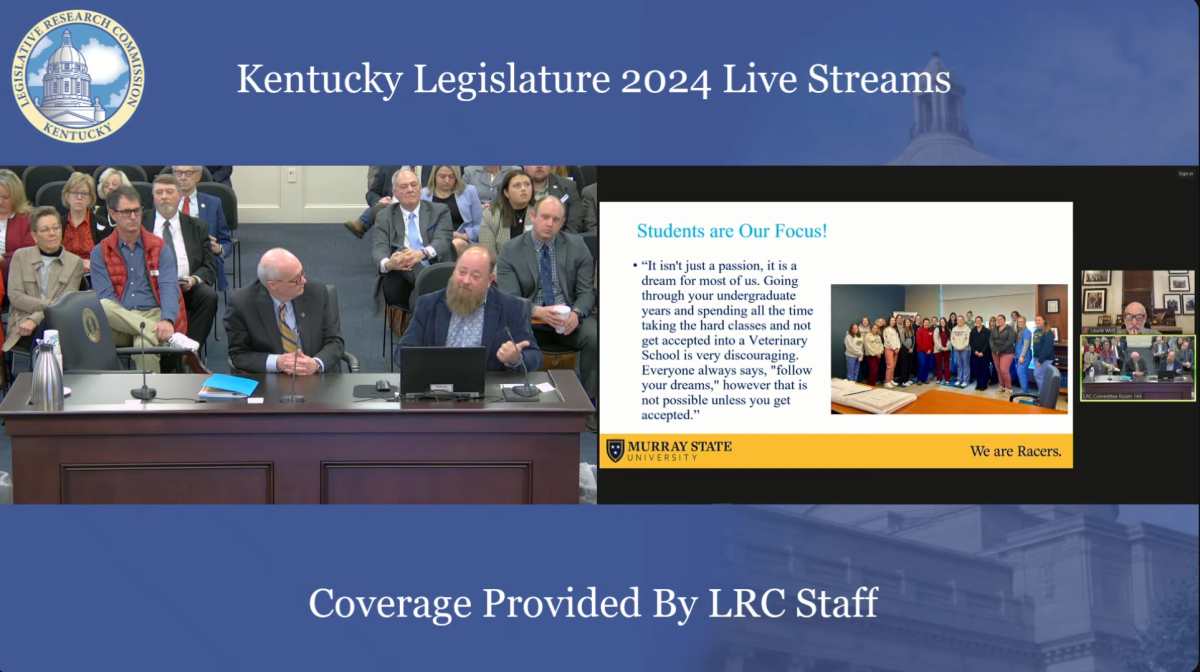Murray State’s pursuit for a School of Veterinary Medicine moved forward Wednesday after the Kentucky House Agriculture Committee passed House Bill 400.
The bill, which would allow Murray State to offer “doctor’s degree required for professional practice and licensure in veterinary medicine,” passed by a 14-2 vote with four abstentions. During the committee meeting, Murray State President Bob Jackson said the vet school would address the shortage across the state, especially in large animal veterinarians.
“Why not create more slots out of the state,” Jackson said. “It’s a basic math problem. There’s more demand than spots and that won’t fix [an] overall shortage.”
Only 32 veterinary colleges are accredited by the American Veterinary Medical Association.
While there is currently no veterinary school in the state, Kentucky has contracts with Auburn University and Tuskegee University in Alabama for seats in their veterinary programs reserved specifically for Kentucky residents.
Brian Parr, dean of the Hutson School of Agriculture, said just over half of students who go to Auburn return to Kentucky after graduation.
Murray State is modeling their proposed program after Lincoln Memorial University in Harrogate, Tennessee.
Parr said the vision for the program’s curriculum is to focus on the clinical distributed model of vet education.
“Then the clinical year partnering with existing practices and industry and nonprofits so that our students get that on the ground education, class size up to 70 students with a focus on rural Kentucky and large animal practices,” Parr said.
The program has the potential to graduate 50-70 vets each year.
Currently, 38 Kentucky students attend Auburn annually and about 45 more go to other programs, where they could rack up as much as $100,000 annually in out-of-state or private school tuition debt, Parr said.
Rep. Shawn McPherson, R-Scottsville, said he would like to see a more detailed economic package to go before the Appropriation and Revenue committee.
“I think we need a more detailed package of how you’re going to run this and how many staff members it will take to do the research,” McPherson said. “I know you’re talking about $89-$90 million to build the building.”
Parr acknowledges that finding professors to staff the school could be a challenge, but some of the factors that push vets out of the field draw them to the academic setting.
Parr said the program would accept 70 students each year.
Rep. Cherlynn Stevenson, D-Lexington, said she is worried about the investment.
“So that 15 million, do you think that that’s really going to be the operational costs or is that just your faculty costs and it’s building maintenance in there at all,” Stevenson said.
In response to Stevenson’s question, Parr said the $15 million is to maintain the property.
“We’ve got upwards of $6-7 million in operational maintenance, that will contribute to this effort even more… and so we add to them and additional $8 to $10 million to cover the faculty expenses to cover those that are associated with paying the stipends for the veterinarians that are working with our students,” Parr said. “It’s very realistic.”
Rep. James Tipton, R-Taylorsville, who also chairs the House Education Committee, said HB 400 does not require the University to have a vet school and will simply change state law to allow it.
Rep. Chad Aull, D-Lexington, said he passed on the vote to talk to veterinarians in his district before making a decision.
“’I’m very concerned about the long term economic impacts of what we’re going to do if we go down this road, and the conflict that will inevitably come up when we hit a economic recession and we have to choose between continuing to find a new veterinarian school at Murray State or continuing our 70-year relationship with Auburn,” Aull said.
The bill now advances to the House.





























































































